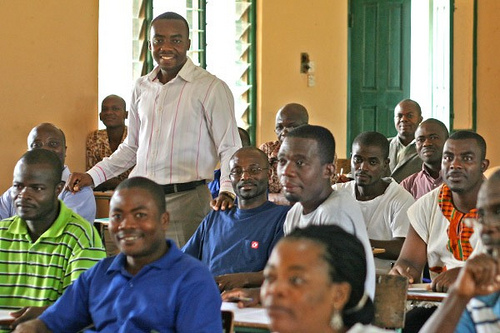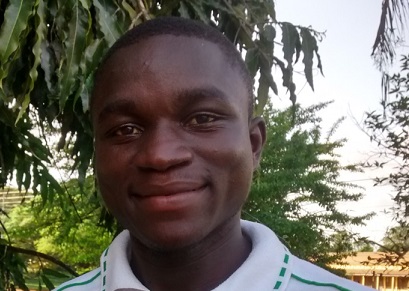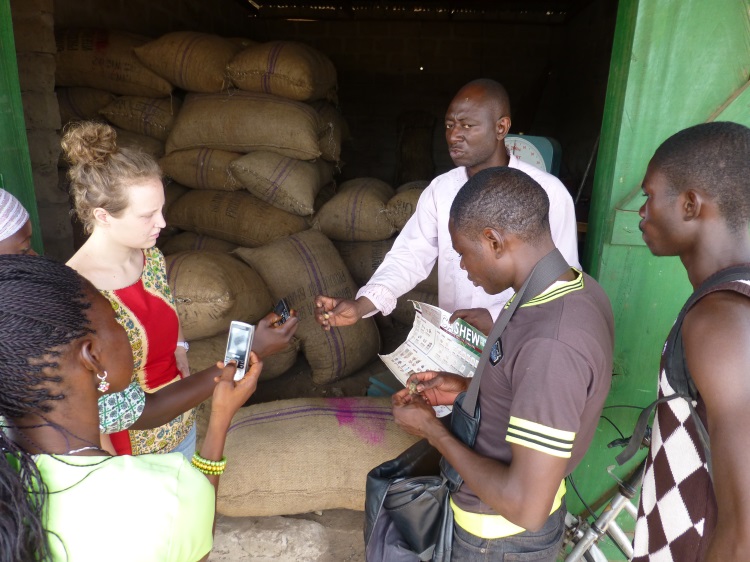-
About
- Our Work
- Get Involved
- Stay Updated
Investing in Youth in Agriculture Engineers Without Borders Canada in Ghana
 Engineers Without Borders Canada (EWB) has been working in Ghana’s agricultural sector since 2004. Engineering is a bit of a misnomer, as we don’t build bridges or roads. Instead, we use the engineering framing of problem solving and systems thinking to address some of the root causes of poverty in Africa.
Engineers Without Borders Canada (EWB) has been working in Ghana’s agricultural sector since 2004. Engineering is a bit of a misnomer, as we don’t build bridges or roads. Instead, we use the engineering framing of problem solving and systems thinking to address some of the root causes of poverty in Africa.Youth: Global Change Makers
Agriculture is the cornerstone of development in Ghana. About 51% of the labour force works directly in agriculture[1] and the sector supports about 80% of the population indirectly[2]. It is estimated that almost 70% of those living in poverty in Ghana are farmers[3].
In order to have an impact on Ghanaian poverty and unlock the potential of these individuals and communities to have dignified and sustainable livelihoods, we have to invest in improving agricultural and food systems. Agriculture is a sector with a huge amount of potential and opportunity, and youth are the future generation that has the ability to realize both.
In Ghana, EWB supported the country’s public agricultural training institutions from 2009-2014. We did so with a partnership-based approach, targeting the quality and innovative potential of the training and education that was offered. EWB’s Agricultural Extension and Advisory Services Venture (AgEx) worked specifically with agriculturalists – extension agents and youth that will be the frontline staff of agricultural development. EWB believes strongly in the capabilities of youth as the global change makers.
Let me paint a picture for you
Imagine an agricultural college campus - a lush green space surrounded by fields full of crops. At the administration area, the main hub of campus, farmers are coming and going, learning and participating in the campus activities. Students are going off campus to gain practical experience in extension and agriculture through creative internal attachment programs and opportunities to work with local farming communities before they graduate.
Commercial farming on campus allows for income generation, providing financial support for colleges to improve their facilities and provide exciting field trips and other practical learning opportunities that require funding. Students are gaining practical skills in technical agriculture, non-traditional agricultural techniques, extension, business, and IT. They're also developing soft skills like presentation and communications skills, creativity, critical thinking and problem solving. There is a variety of levels of education from short courses to degrees ongoing.
This is a picture of an institution that is highly connected to the agricultural system locally and nationally. An institution that is innovative and dynamic, offering leading-edge training for its students. The colleges face challenges in working towards this vision.
A lack of regular and appropriate funding, gaps in skills of staff and lecturers and a bureaucracy in which change is slow can all contribute to a discouraging environment for innovation and growth. The colleges have worked with EWB to create diverse funding pipelines, build the capacity of staff and enable an institutional culture of innovation to support the ability of the college to work towards their vision and potential.
Supporting agricultural young professionals
Here are some of the activities that EWB supported:
Agribusiness and Entrepreneurship Project: EWB co-developed with the colleges a practical Agribusiness and Entrepreneurship Project, which builds students’ practical agribusiness skills. The project enables students to plan and implement their own agribusiness within a semester, giving them first-hand experience in piloting a venture.
Students gain the knowledge, skills and attitudes of entrepreneurship, innovation and social responsibility. Students are encouraged to become job creators rather than job seekers and to understand the crucial role that they play for the future of Ghana’s agricultural sector.
Internal Attachment Program: Kwadaso Agricultural College and EWB designed a new type of Attachment Program for first year students to build the core competencies necessary for graduates to succeed as agricultural professionals.
The program is a community-based, experiential learning program where agricultural college students actually go out and stay, eat, sleep and work with farmers for an extended period of time. While staying with the farmers, students co-define and prioritize agricultural problems, which they research when back on campus. At the end of the program, the students provide extension back to farmers through sharing what they learned about the problems identified in the communities.
“The students who did the practical attachment, without doubt, will be a better group of agriculturalists. We’ve talked to them and we see that they are quite different.”
Mr. Alhaji Musah, Administrator of Kwadaso Agricultural College
Innovation Committee: The Agribusiness and Entrepreneurship Project and Internal Attachment Program described above are examples of innovations within the college system. However, individual innovations only go so far. EWB worked with the colleges to build their institutional capacity for innovation – so that college lecturers could implement future ideas without the support of EWB.
In 2014, Kwadaso Agricultural College launched internally generated funds and an external affairs unit through ideas brought forward by the Innovation Committee. Innovation needs to go beyond one-off changes – it needs to be an institutional culture with an enabling environment in which ideas flourish. These innovations will keep the colleges dynamic and relevant in an always evolving agricultural sector.
In these partnerships, EWB’s role has been to inspire, catalyze and support changes with our partners. Although EWB’s agricultural college program in Ghana has finished, the changes it supported will continue to be sustained by college staff and lecturers. EWB continues to be active in Ghana, with an ongoing focus on food systems and youth engagement.
And in December you will know...
In December, you will have the chance to learn more about 3 youth champions who have benefitted from the Internal Attachment Program (IAP), the Agribusiness and Entrepreneurship Project (A&E Project) and the Junior Fellowship Program of EWB! Nicholas Onwona: "I want to live in the rural areas, that's where the money is.”
Nicholas Onwona: "I want to live in the rural areas, that's where the money is.”Nicholas Onwona comes from the Eastern Region of Ghana. He is building his skills as a young agriculturalist through his studies at Kwadaso Agricultural College. As Nicholas gets closer to the end of his education, he is aware that building his own skills is not enough, he also wants to inspire his fellow youth to understand the opportunities available in the agricultural sector. Click here to read Nicholas' story.
 Ruth Quaye: "I've learned I can do something on my own without depending on others"
Ruth Quaye: "I've learned I can do something on my own without depending on others"Ruth Quaye graduated from Ejura Agricultural College in 2012. Now she works in a private agribusiness that distributes agricultural inputs and products, such as fertilizer and pesticides. Ruth acts as the company`s agronomist. She is still interested in also having her own business, but finds it challenging to start, with capital scarce in the system. Click here to read Ruth's story.
 Emmanuel Akotia: "I am proud to be a farmer"
Emmanuel Akotia: "I am proud to be a farmer"At Kwadaso Agricultural College Emmanuel Akotia or 'Emma' is the head of the Student Representative Council. He is a born and bred leader. As he prepares to graduate in early 2015, he is set to continue that leadership, showing Ghanaian youth that you can become a successful business person in agriculture. Click here to read Emma's story.
Every Wednesday of December, Miriam Hird-Younger, AgEx Venture Leader, will bring to us the success story of one of these youth champions. Stay tuned!!!
[1] FASDEP II. (August, 2007.) Ministry of Food and Agriculture. Page 4.
[2] Duncan, Beatrice Akua. (May, 2004.) Women in Agriculture in Ghana. Frederick Ebert Foundation Ghana. Page xiv.
[3] Al Hassan, Ramatu and Colin Poultry. (January 2009.) “Agriculture and Social Protection in Ghana.” Futures Agriculture. Page 3.
About the author
Related Posts
Comments
No comments made yet. Be the first to submit a commentBy accepting you will be accessing a service provided by a third-party external to https://www.ypard.net/
Get in touch
Email: [email protected]
YPARD Global Coordination UnitHosted by AGRIDEA and the Czech University of Life Sciences Prague
Lausanne, Switzerland and Prague, Czech Republic - Our Work

 Nicholas Onwona: "I want to live in the rural areas, that's where the money is.”
Nicholas Onwona: "I want to live in the rural areas, that's where the money is.” Ruth Quaye: "I've learned I can do something on my own without depending on others"
Ruth Quaye: "I've learned I can do something on my own without depending on others" Emmanuel Akotia: "I am proud to be a farmer"
Emmanuel Akotia: "I am proud to be a farmer"